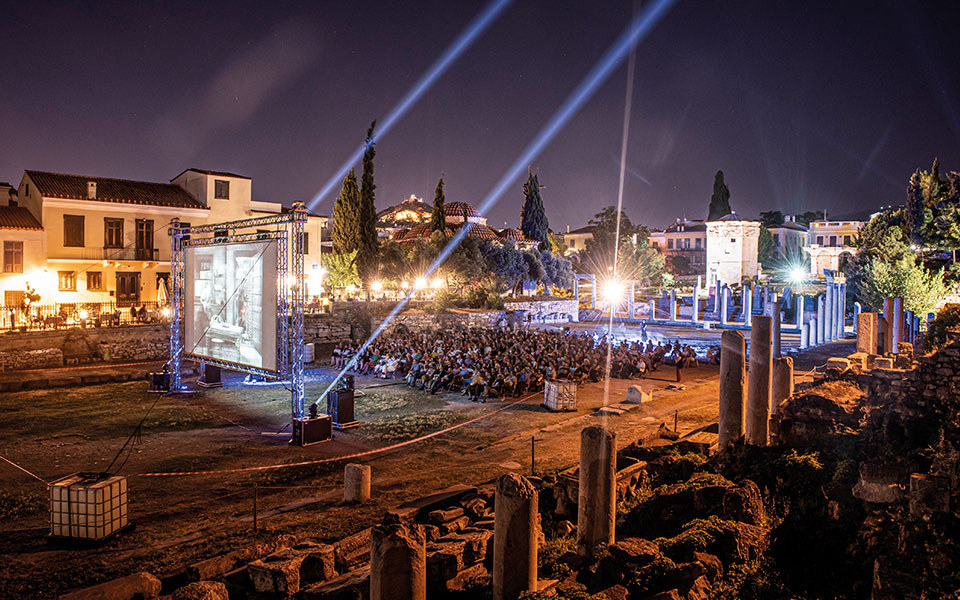The capital of open-air cinemas
A city like this one wouldn’t normally need an event like the Athens Open Air Film Festival (AOAFF). After all, it already has an extensive network of open-air cinemas showing both new productions and classic masterpieces that film buffs never get enough of, at movie theaters under the stars, on rooftop terraces – sometimes even with a view of the Acropolis – or tucked away in the courtyards between apartment blocks.
This, however, is precisely the spirit of the 12-year-old festival that has become such an intrinsic part of the Athens summer experience. Always brimming with great ideas, the organizers of the AOAFF come back every summer, transforming the most unlikely of spaces into bright islands of cinematic delight. It might be the cool garden of an embassy or a museum, a popular pedestrianized street near the Acropolis, or a park that’s also an archaeological site, such as the Akadimia Platonos. This year, the festival – co-organized by the Premiere Nights Athens International Film Festival and the City of Athens’ Organization for Culture, Sports and Youth (OPANDA) – has taken to the islands as well, with screenings on Mykonos and Serifos. – Dimitris Rigopoulos
info
Check out the full program at aoaff.gr
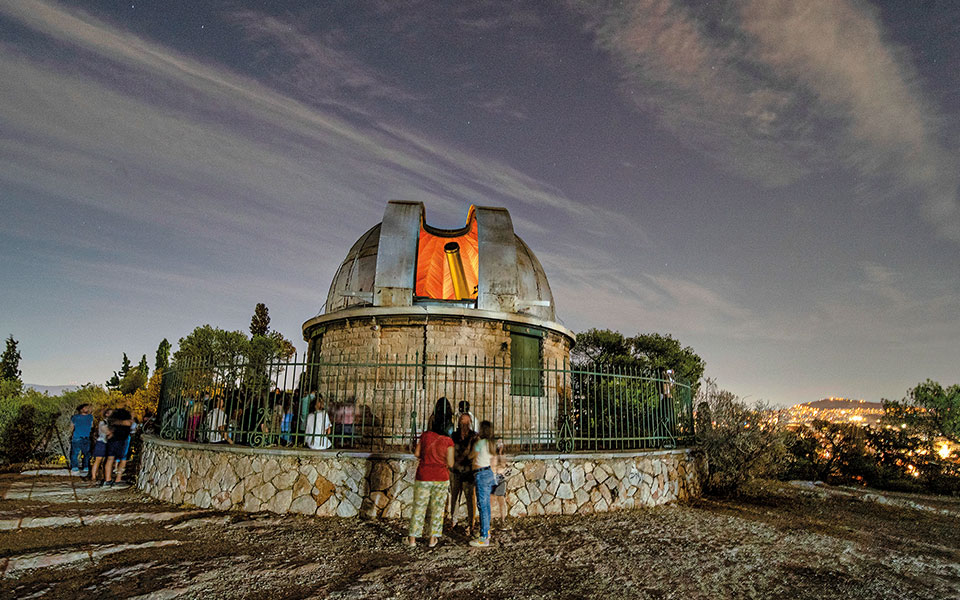
© Perikles Merakos
Stargazing above the city
Atop the pine-covered Nymph’s Hill, a little west of the Acropolis, stands the National Observatory of Athens, an astronomical research institute and observatory. In fact, it’s hard to miss it, mainly due to its striking dome. Designed by the architect Theophil Hansen in 1842, this remarkable building surrounded by lush gardens is an easily accessible and quiet place from which to view the city, particularly after the sun has set.
Visitors can wander the grounds of the historical library and there are guided tours of the Observatory as well, affording close-up views of 200-year-old scientific instruments and a modern replica of the ancient Antikythera Mechanism. The tour concludes, weather permitting, with a stargazing session using the 170-year-old Doridis telescope. If the sky is cloudy, you can return another night using the same ticket and try again. – Simos Kavalieratos
Info
Open on Wed, Fri, and Sat. Tours in English start at 22:00 (or 21:00 after August 7). [email protected], Tel: (+30) 210.349.0160, 210.349.0036.
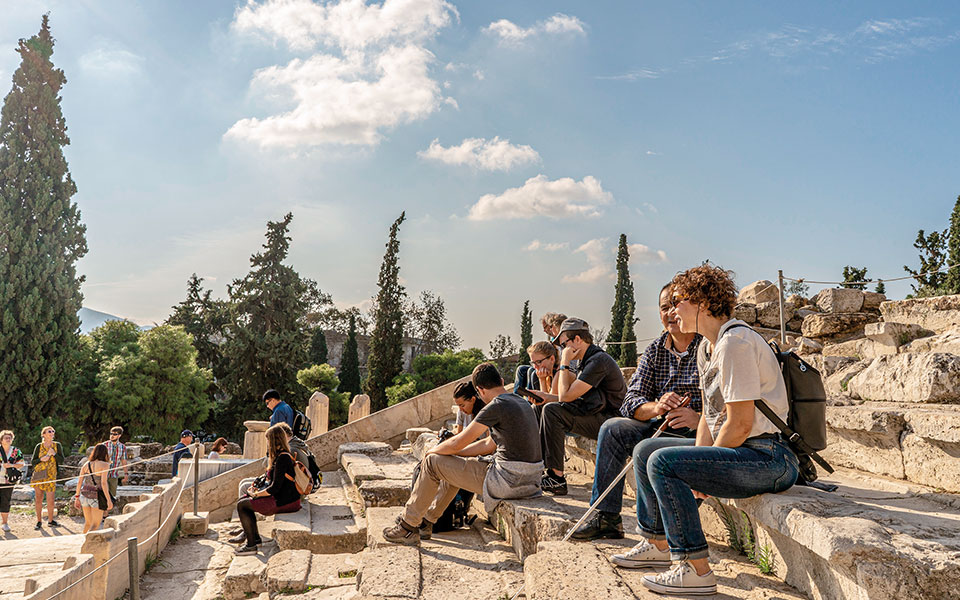
© Shutterstock
Open to everyone
Although the term generally used to describe tourist activity is “sightseeing,” there’s no need to be fixated on the visual element of the word. Fortunately, Athens has the ability to stimulate all five senses; some attractions have started offering unique experiences for visitors who are sensory impaired, striving to make the Greek capital a more inclusive travel destination. Through their In Touch program, the Museum of Cycladic Art – which ought to be on your must-see list – is offering visitors the opportunity to explore its permanent collection through replicas made of marble or resin, and tactile maps of Greece and the Cyclades.
The star of all tourist itineraries for Athens, the Acropolis, needn’t be apprehended solely through sight. The tour company Alternative Athens, which always aims to provide visitors with new and unexpected tourist experiences, seeks to convey the experience of visiting the rock through other sensory means. “After all, whether sighted or blind, when we visit archaeological sites, we need to use our imagination, to ‘see’ things that aren’t there anymore. We’re all expected to mentally reconstruct what’s missing,” says tour guide Danae Kousouri. – Simos Kavalieratos
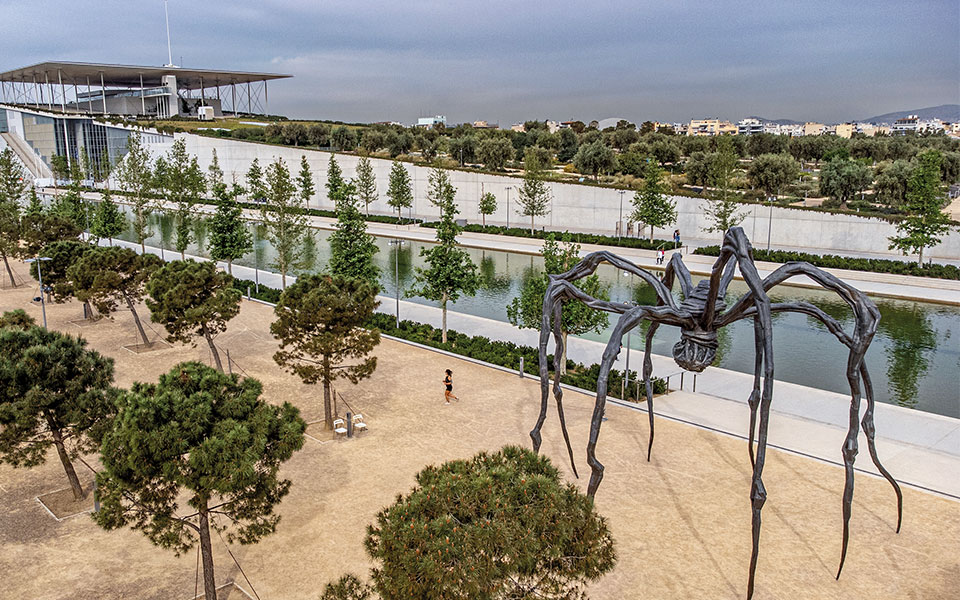
© Nikos Karanikolas © The Easton Foundation/Reproduction license from OSDETE, ATHENS, & VAGA at ARS, NEW YORK, USA
The mother spider
“Every day, you have to abandon your past or accept it and then, if you cannot accept it, you become a sculptor,” said Louise Bourgeois (1911-2010) in 1992. Even though her oeuvre comprises many different mediums – including drawing, painting, performance and engraving – she’s regarded as one of the great sculptors of the 20th century. That she would spend her life shaping different figures with her hands is something that was evident from childhood, when she’d respond to her father’s angry outbursts at the family dinner table by making tiny figurines out of bread which she’d then tear apart and devour.
All of the artist’s works contain references to her childhood and personal life, which is what makes them so compelling. Spiders are also a recurring motif, one which first appeared on paper in the 1940s, though the first sculpture, made of steel, from her now-famous Spider series was unveiled in 1994 at the Brooklyn Museum. “The Spider is an ode to my mother. She was my best friend. Like a spider, my mother was a weaver. Spiders are helpful and protective, just like my mother,” the artist said. However, the sight of the imposing, more than 10-meter-tall sculpture that now stands guard over the Esplanade at the Stavros Niarchos Foundation Cultural Center cannot help but make you think of the conflicting emotions the French-American artist must have had about motherhood. -Xenia Georgiadou
Info
Louis Bourgeois’ iconic “Maman,” is on view in Athens thanks to the efforts of the SNFCC and the NEON cultural organization. * To 06/11, snfcc.org, neon.org.gr
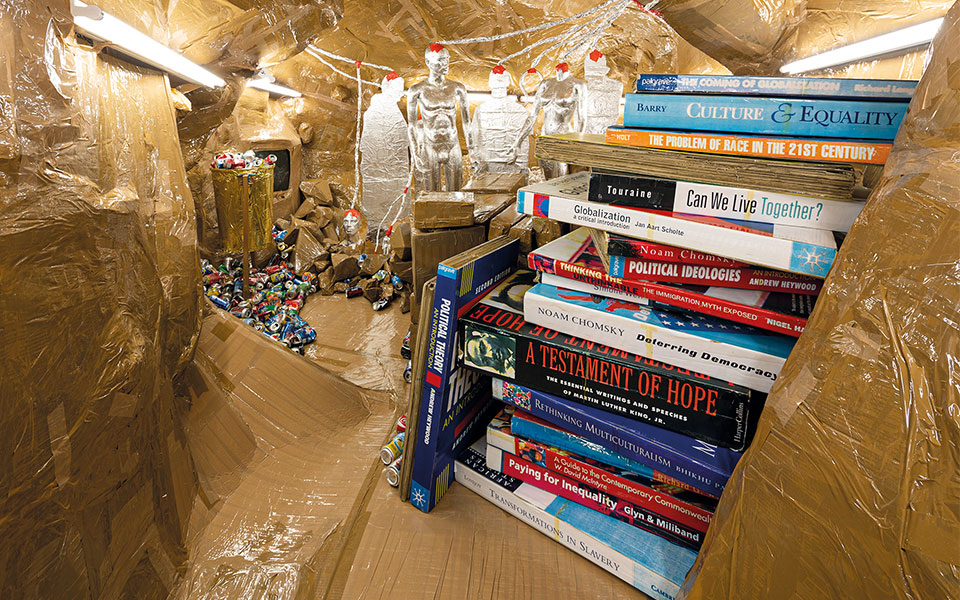
Untenable dreams
The building that once housed the Public Tobacco Factory in the suburb of Kolonos has been given a new lease on life as a cultural space, but its own story touches much more on history than art. It was bombed by the Allies in World War II, housed refugees, and was used as both a factory and a warehouse for tobacco. “It has always been a space defined by tension, protest, conflict, dreams and fantasy,” notes Elina Kountouri, the director of the NEON cultural organization.
It is, in fact, the perfect setting for a contemporary art exhibition, and “Dream On” represents the second time that NEON has used the venue for one of its shows. Eighteen large-scale installations by Greek and foreign artists, along with an audio piece by Kostas Ioannidis, have taken over this iconic building’s courtyard, customs office and first and second floor. In explosions of color and ingenious combinations of different techniques and ready-made objects, the pieces speak of mortality, climate change, the trauma of war, nature’s dominance over the human presence, the effects of globalization, and our addiction to consumerism. – Xenia Georgiadou
Info
To 27/11, Former Public Tobacco Factory: 218 Lenorman, Kolonos, neon.org.gr
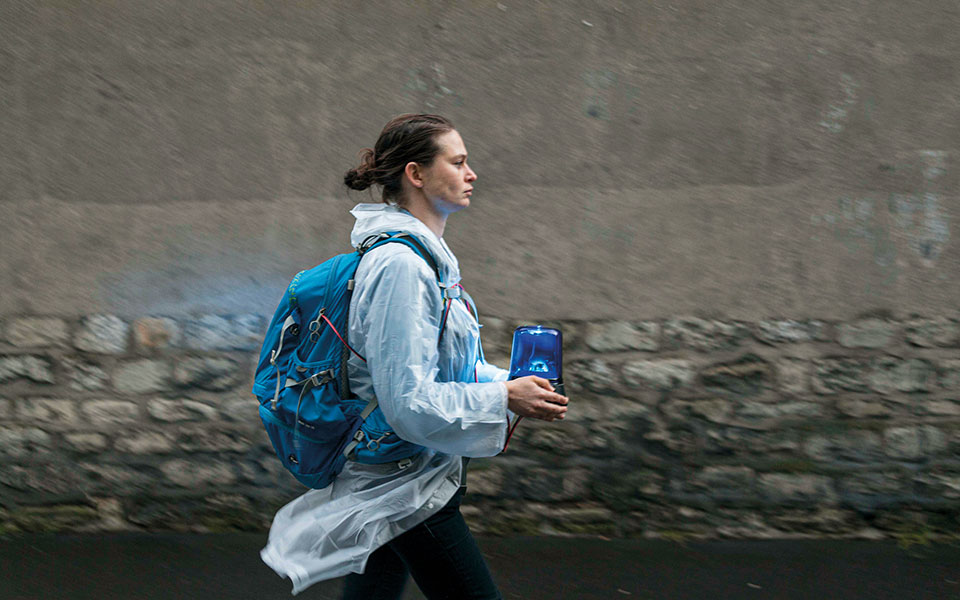
© Katya Ev, Augenmusik, 2016 Courtesy of the artist and M HKA (BE) Photo: Mathilde Geldhof
Concepts under development
The National Museum of Contemporary Art (EMST) is located in a city landmark of particular architectural and sociological significance. When the FIX Brewery decided to move its operations in the late 19th century to the junction between Syngrou and Kallirois avenues, the area was undeveloped. The brewery first stood alone, but was soon followed by other businesses that brought life to this part of Athens. The building was abandoned in the late 1970s, but the relocation of the EMST after the building’s restoration and renovation in 2015 seems to have turned the neighborhood of Neos Kosmos and the broader vicinity into one of the capital’s most vibrant districts.
In this impressive space, visitors can view works by Greek and foreign artists that make up its permanent collection and tour one of the five temporary exhibitions signaling a new era for the museum, under the leadership of artistic director and art historian Katerina Gregou, who’s also the curator of the main temporary show, “Statecraft (and beyond).” This exhibition invites us to ponder our relationship with the state. What is the state to each of us, a boogeyman or a guardian? A restrictive framework of action or a free platform for exchanging ideas and customs? And what constitutes a nation? People with common roots? With common characteristics, religion or language? With the participation of 39 artists, “Statecraft” veers away from conventional narratives about concepts of nation and state to talk about inequality and authoritarianism, the rise of nationalism and poverty, and the mass migration waves triggered by armed conflict. -Xenia Georgiadou
Info
To 30/10, National Museum of Contemporary Art: Kallirois & Frantzi, Neos Kosmos, emst.gr

© Konstantinos Parthenis, Bathers, before 1919 Donated by Sofia Partheni National Gallery-Alexandros Soutsos Museum inv. no. 6504
Parthenis’ Greece
The Greek National Gallery, founded in 1900, spent its first years focused on acquiring foreign works. In February 1919, its new artistic director, Zacharias Papantoniou, recommended the purchase of “The Slope,” a painting by Konstantinos Parthenis’ (1878-1967). It was a watershed moment for the institution, redefining how it would enrich its collection, putting modern Greek art front and center and becoming one of its most ardent guardians. Now, in a new chapter for the museum following a recent radical revamp, Konstantinos Parthenis is the subject of an homage.
“Parthenis’ oeuvre is defined by constant protean transformations. Only Picasso can be compared with him in this regard,” commented the late Marina Lambraki-Plaka, the National Gallery’s long-serving director. The exhibition “Konstantinos Parthenis: Painting an Ideal Greece,” shows us the world of this Alexandria-born painter, exposing his intellectual musings, creative interests and obsessions. It also reveals an artist with a sense of his own importance and a professor – at the Athens School of Fine Arts – with a radical teaching style. With more than 150 paintings and 70 drawings, the show spans his entire career from the late 19th century to the late 1960s, shedding light on influences ranging from ancient and Byzantine art to the modernist movements of his own time. -Xenia Georgiadou
Info
To 28/11, National Gallery: 50 Vassileos Constantinou, nationalgallery.gr

© Museum of Cycladic Art/Paris Tavitian, Nicoletta Menti
Simplicity in art
“Brice Marden and Greek Antiquity,” curated by artist Dimitrios Antonitsis, is part of the “Divine Dialogue” series, organized by the Museum of Cycladic Art, that takes place at regular intervals and seeks to trace connections between contemporary forms of expression and ancient Greek art. The idea for this particular exhibition belongs to Antonitsis, who knew how much Marden admired the Greek landscape and light. The show includes 44 exhibits – paintings, painted marble, drawings and notebooks – sourced mainly from Marden’s own collection. These are things he looks at when having his coffee, art he created at his second home on the Saronic island of Hydra, and pieces that belong to his wife or his daughters, all of which adds a wonderful note of intimacy to this fascinating encounter. -Xenia Georgiadou
Info
To 29/08, Museum of Cycladic Art, Stathatos Mansion: Vassilissis Sofias & 1 Irodotou, cycladic.gr
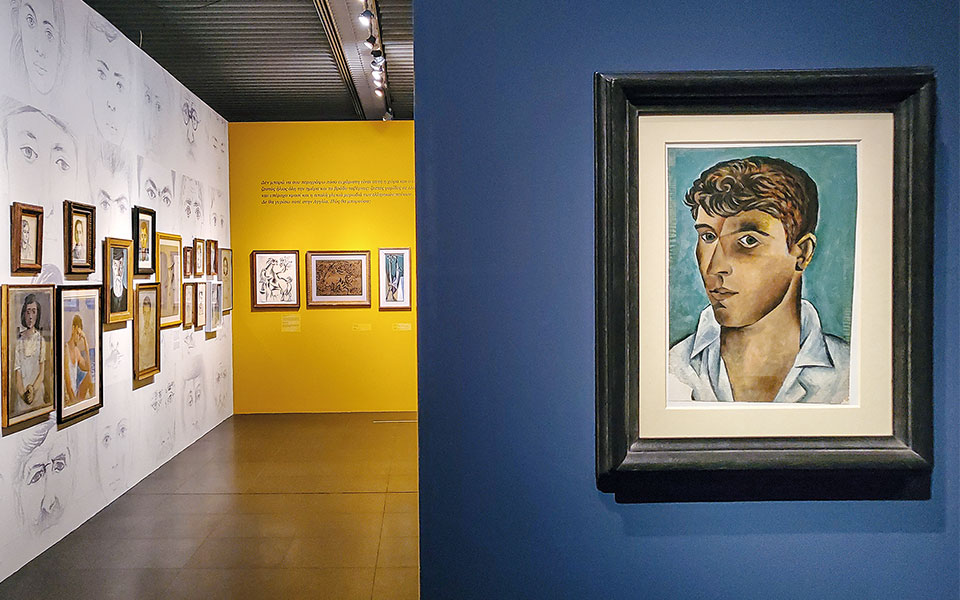
The hedonistic John Craxton
A large photograph of John Craxton (1922-2009) riding his motorcycle welcomes us at the entrance of the Benaki Museum’s temporary exhibition hall. Taken in 1984 in Crete’s White Mountains, it’s a glimpse into how the acclaimed British landscape painter and portraitist spent his life in Greece voraciously collecting images and stimuli. There is perhaps no museum more suitable to host this retrospective, titled “John Craxton: A Greek Soul.” An ark of Greek history, the Benaki has in its permanent collection artworks and other objects from the 6th century BC to the decades just after the establishment of the modern Greek state. Such a grand scale suits the appetite of the late “heroic hedonist,” as Craxton is described by his biographer, Ian Collins, who also curated the show.
The artist first visited Greece in May 1946 at the age of 23 and instantly fell in love. Back home in the UK, he and his friend and fellow artist Lucian Freud had been described as archetypal proponents of a melancholic neo-Romanticism; Craxton, uneasy with that label and unfulfilled as an artist, was looking for something new; it turned out to be Greece, and its light, its people and its way of life became a compass that pointed him to a new way of life and a new style of art. -Xenia Georgiadou
Info
To 11/09, Benaki Museum of Greek Culture: 1 Koumbari & Vassilissis Sofias, benaki.org
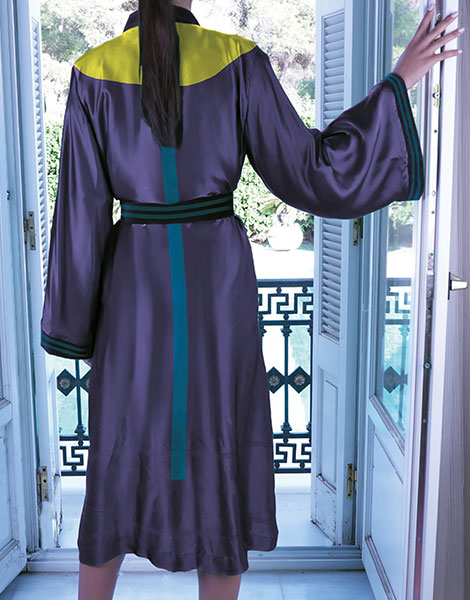
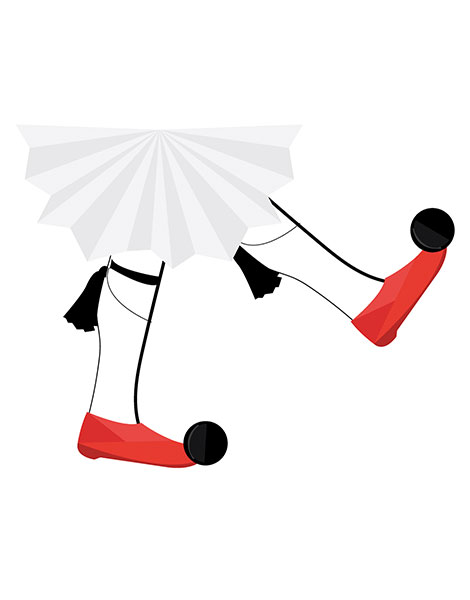
Stay connected with Greece
“The idea was to create motifs that would represent the modern image of Greece while still focusing on core elements representing our country, such as the sun, the blue of the sea and our history,” says Ioanna Dretta, CEO of Marketing Greece, explaining the philosophy behind Greek Lines, a collection of memorabilia featuring products of minimalist aesthetic design that reflect the country’s culture, history, and natural beauty. T-shirts, beach towels, cosmetic pouches, pochettes, art prints, canvas shopping bags, key chains and more have been created in collaboration with Greek brands such as Callista Crafts, Marmarometry, AddStyle, Bleecker and Love, PrintSin, Pennie, Zoulovits, Brand Plus, Graffiti and Mia Papa. Part of the sales proceeds of these products will go to supporting Greek tourism.
Info
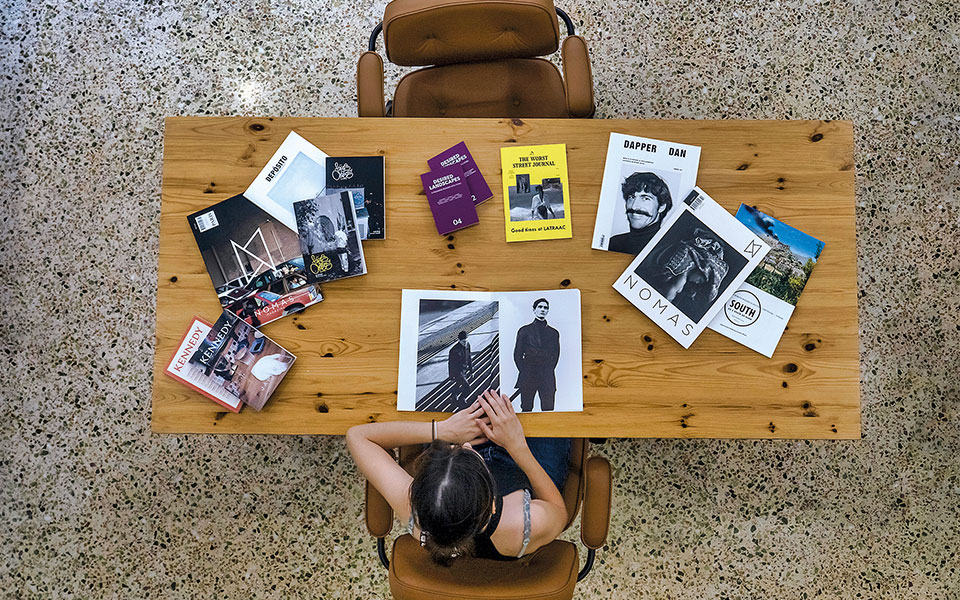
All that looks good on paper
Athens is home to a staggering array of contemporary magazines and journals, produced by creative nostalgic types who insist on expressing themselves on paper despite living in this digital age. The English-language Kennedy magazine, which boasts contributors from all over the world, the pocket-sized travel guide magazine Desired Landscapes, Dapper Dan for men’s style and fashion, Nomas for art and travel, are but a few periodicals created and published in the Greek capital. Most of these can be found at the Hyper Hypo bookstore, which specializes in publications on pop culture and the visual arts. Here, you’ll also find a great selection of amazing magazines from all over the world.
If you’re looking for an extensive selection of international titles, the Athens Zine Bibliotheque, created by architect Panagiota Theofilatou and graphic designer Tasos Papaioannou, has more than 1500 of them. Every year, the couple enrich their collection with 100 new titles, designed in America, Russia, Hong Kong, Greece and elsewhere in Europe. There are themed and specialist zines, as well as some that are rather valuable, including handmade copies – check out the one designed by a refugee woman at one of the migrant camps in Greece; it’s incredibly moving and inspiring.
This is a reading library space; nothing is for sale or lending, but should you be interested in purchasing a copy, you can make note of the creator’s details and get in touch with them. You can stay up to date on the various activities of Athens Zine Bibliotheque through their Facebook page, as they prepare for a full program of events in Athens, Sikinos and Kavala this summer. If you are a creator, you can add your own publication to the library, leaving your mark in a city that proudly supports independent publishers. -Nena Dimitriou
Info
Hyper Hypo, 10 Voreou, Monastiraki, Tel. (+30) 211.7359.628.
Athens Zine Bibliotheque, 19 Korinthias, Ampelokipi, Tel. (+30) 210.6452.631.
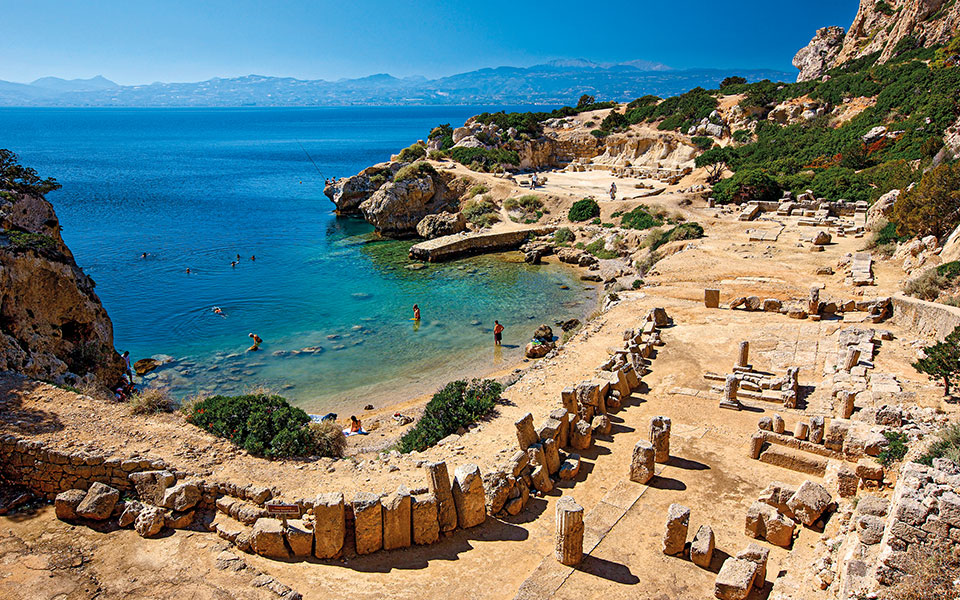
© Shutterstock
Like being on an island
You probably didn’t come to Athens to swim as, for some reason, not many visitors associate the capital with the country’s main tourist products: the sun and the sea. Put the blame on the all-powerful appeal of the Parthenon, or on the media features that stress the city’s entertainment and leisure options, its excellent food and drink venues, and its proximity to the islands, and then correct the mistake by hitting the shore. If you’re in Athens between May and October, you can swim at lovely beaches that are no more than a 30 to 60-minute drive from the city center.
There’s something for all tastes: friendly, family-oriented, full-facility beaches, such as the popular Akti Vouliagmenis (entry fees begin at €10); beaches redolent of the islands, such as Althea in Aghia Marina and KAPE near Legrena; beaches of unique natural beauty, such as the one at Schinias, nestled in a pine forest; and beaches next to archaeological sites, such as Heraion, 18 kilometers west of the popular seaside town of Loutraki. Akti Vouliagmenis and Althea can be reached by bus (122 and 117). To get to Legrena and Schinias, take the KTEL regional bus to Sounion and Marathon, respectively. Of course, the easiest option may be to rent a car, which is probably necessary should you opt for Heraion. For all beaches, avoid the weekends if you want a quiet swim and a relatively easy drive. -Dimitris Rigopoulos
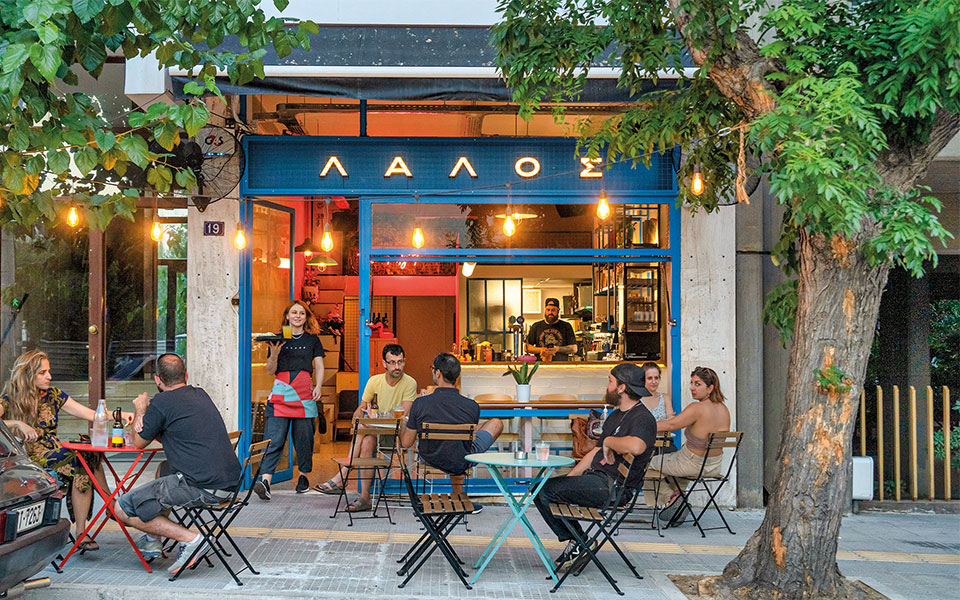
© Angelos Giotopoulos
Neos Kosmos: The new, up-and-coming hangout for food and drink
Much-anticipated performances, exhibitions and lectures by important individuals attract crowds of Athenians to this contemporary cultural hub in the heart of Athens. As foot traffic to the area has increased in recent years, bars and all-day cafes have sprung up along the road behind the Stegi, creating a new destination for the intellectually curious to meet up over food and drink.
Naif (10 Leontiou, Neos Kosmos, Tel. (+30) 210.933.4946) serves great coffee and brunch, and you can follow your afternoon aperitivo with pizza. A bit further along, Lalos (19 Evridamantos, Neos Kosmos, Tel. (+30) 210.937.3987) is a relaxing all-day hangout that offers a wide selection of single-origin coffees, homemade cinnamon rolls, and a delicious breakfast menu that includes eggs prepared in a variety of different ways. The drinks list features beers from Greek microbreweries, colorful cocktails, and a selection of snack dishes, such as the crispy chicken sando. The brand new Grasshoppers (6 Evridamantos, Neos Kosmos, Tel. (+30) 210.934.0708) offers expertly made cocktails in an unpretentious yet elegant space. Τry either a Fervid, a smoked version of the classic Margarita with mezcal, raspberry, lime, and bitters, or a bittersweet Coarse. Pair your drink of choice with quality bar food – from vitello tonnato to an Italian-style club sandwich. -Georgia Papastamou
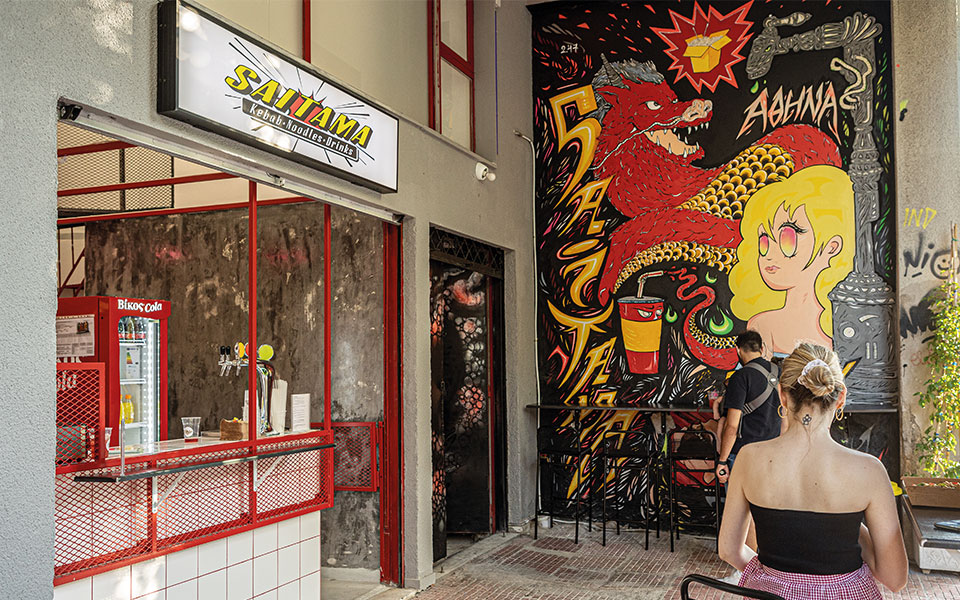
© Sofia Papastrati
Saitama: kebabs and noodles
The protagonist of the Japanese anime “One Punch-Man,” who neutralizes his opponents with a single punch, gave his name to this original street-food joint in Kerameikos. With a comic book aesthetic and a menu featuring kebabs, playful fusion noodles and cocktails on tap, Saitama is a delicious world of its own. On the sidewalk in front of the shop – and soon on picnic tables that will be set up in the vacant lot, an urban empty space among the apartment buildings and parked cars – you can indulge in chicken kebabs with satay sauce and peanuts, or beef curry noodles with roasted carrots, ramen eggs and furikake, or other great choices, together with a refreshing beer, a Negroni infused with cherry or strawberry flavor, or a Mai Tai with grilled pineapple cordial. -Angela Stamatiadou
Info
10 Kerameikou, Kerameikos
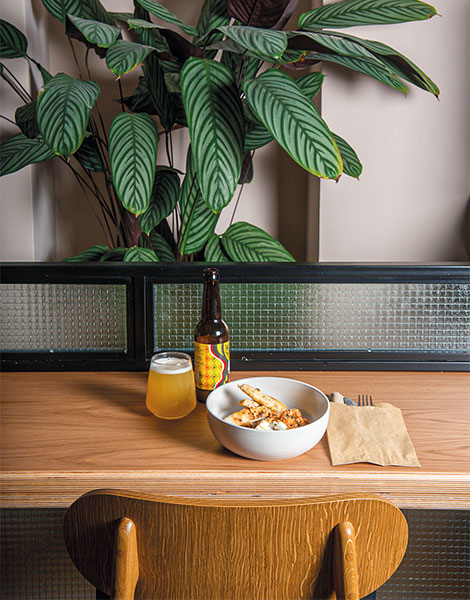
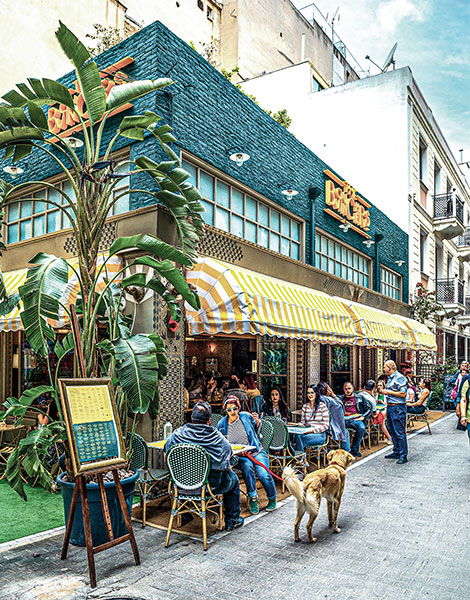
© Perikles Merakos
Psyche: wine for the soul
In Greek mythology, Eros and Psyche were the parents of Hedone, goddess of pleasure. Inspired by the myth, the owners of this new wine restaurant named their venture Psyche. Located in one of the city’s most charming arcades, the space previously housed a goldsmith’s workshop. Today, the restaurant serves beautifully prepared Mediterranean cuisine with an emphasis on seafood, and boasts an exceptional wine list featuring more than 60 Old and New World wines. Try the rosé xinomavro with grilled fish and tarama, or a grilled beef filet from Limnos. In fact, no matter what you choose, you’re unlikely to be disappointed! -Nena Dimitriou
Info
4 Kornarou, Syntagma, Tel. (+30) 210.322.1271
Lazy breakfast at The Brunchers
This brunch hotspot in Psyrri recently opened its doors to the public. Located on one of the most popular corners in the neighborhood, and with no vehicular traffic to diminish the charm of its sidewalk tables, The Brunchers offers several classic breakfast-brunch options, such as different types of eggs, pancakes, fruit bowls, yogurts and granola. The place also serves a small selection of well-made cocktails. It opens at 08:00 and closes at 16:00 each afternoon, just in time for the perfect lazy lunch to come to its natural end. -Georgia Papastamou
Info
5 Aghias Theklas, Psyrri, Tel. (+30) 697-25.36.303

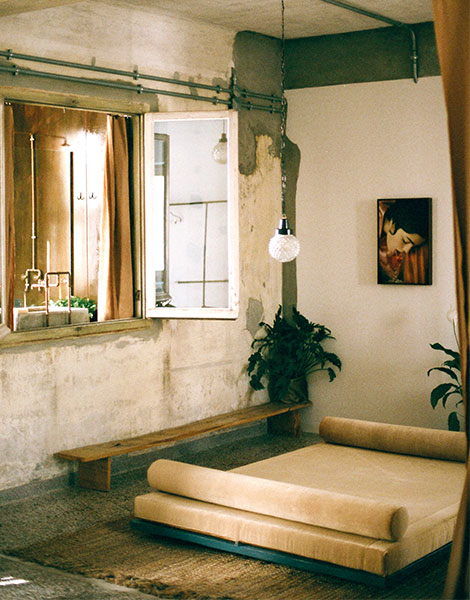
Mona: More than a hotel
In Athens, the accommodation options are countless and include everything from five-star resorts to very affordable Airbnb options only a few steps from Syntagma Square. If you’re looking for a special hotel experience, the brand new Mona, a boutique hotel in the colorful neighborhood of Psyrri, beckons. The hotel occupies a 1950s industrial eight-floor building, renovated with respect to its 70-year history. In addition to the 20 rooms – each with a unique character – the building also houses an art gallery, a concept café-bar and a speakeasy basement venue, and a rooftop with a wonderful view of the Acropolis.
Art is everywhere at Mona’s, but the works themselves and their placement make it seem like they were acquired over time by a private collector to decorate his or her own house in line with their personal taste, rather than chosen to hang in a commercial enterprise. The furniture has been designed by the studio House of Shila, and the homeware items (both utilitarian and decorative) have been selected to match Mona’s aesthetics by creative art director Eftihia Stefanidi. The care taken by the owners is reflected in special details such as the selected coffee, the special products in the mini bar, and the music available to play in the rooms. Each of these choices is a statement on their philosophy of hospitality; as they put it, Mona is “designed to make you feel at home and yet in a dream.” -Nena Dimitriou
Info
4 Kakourgodikiou, Psyrri, mona-athens.com

